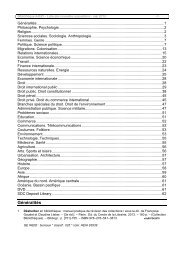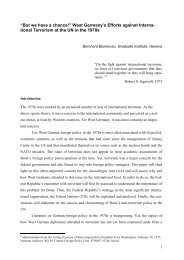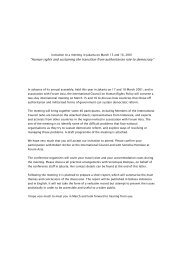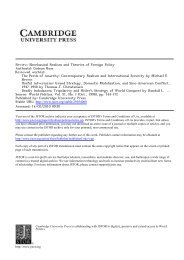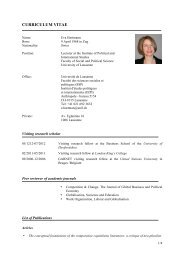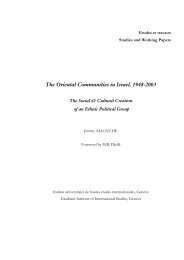Extending International Criminal Law beyond the Individual to ...
Extending International Criminal Law beyond the Individual to ...
Extending International Criminal Law beyond the Individual to ...
You also want an ePaper? Increase the reach of your titles
YUMPU automatically turns print PDFs into web optimized ePapers that Google loves.
<strong>Extending</strong> <strong>International</strong> <strong>Criminal</strong> <strong>Law</strong> 923<br />
dedicate as much, if not more, space <strong>to</strong> <strong>the</strong> violations committed by <strong>the</strong> nonstate<br />
ac<strong>to</strong>rs as <strong>the</strong>y do <strong>to</strong> addressing <strong>the</strong> states concerned. The mechanism visa'<br />
-vis <strong>the</strong> non-state ac<strong>to</strong>r works not only through naming and shaming but by<br />
encouraging <strong>the</strong> non-state ac<strong>to</strong>r <strong>to</strong> submit an ‘action plan’ <strong>to</strong> <strong>the</strong> Security<br />
Council, in this way <strong>the</strong> group can be removed from <strong>the</strong> list of viola<strong>to</strong>rs. One<br />
group that has supplied such an action plan and claims <strong>to</strong> no longer be<br />
a viola<strong>to</strong>r is <strong>the</strong> Forces Nouvelles (FAFN) in Co“ te d’Ivoire. The Security Council<br />
has in mind that it could adopt ‘country-specific resolutions, targeted and<br />
graduated measures, such as, inter alia, a ban on <strong>the</strong> export and supply of<br />
small arms and light weapons and of o<strong>the</strong>r military equipment and on military<br />
assistance, against parties <strong>to</strong> situations of armed conflict which are on <strong>the</strong><br />
Security Council’s agenda and are in violation of applicable international law<br />
relating <strong>to</strong> <strong>the</strong> rights and protection of children in armed conflict’. 72 The<br />
assumption here is that <strong>the</strong> non-state party <strong>to</strong> <strong>the</strong> conflict is violating international<br />
law. Although <strong>the</strong> reports are hazy (<strong>to</strong> put it gently) on which norms of<br />
international law are actually being violated, and make very little reference <strong>to</strong><br />
international criminal law, <strong>the</strong> prospect of follow-up sanctions by <strong>the</strong> Security<br />
Council is premised on <strong>the</strong> idea that <strong>the</strong>se groups have violated international<br />
law, and not simply a set of moral imperatives.<br />
Third, in addition <strong>to</strong> <strong>the</strong> threat of sanctions imposed by <strong>the</strong> Security Council,<br />
or indeed <strong>the</strong> threat of individual prosecution at <strong>the</strong> ICC, rebel groups may have<br />
o<strong>the</strong>r reasons for seeking <strong>to</strong> be seen <strong>to</strong> abide by apparent international obligations.<br />
The work of Geneva Call in engaging armed groups in ‘Deeds of<br />
Commitment’ regarding a ‘<strong>to</strong>tal ban on anti-personnel mines and for cooperation<br />
in mine action’ can provide some insights. 73 First, rebel groups realize <strong>the</strong><br />
advantages of being seen <strong>to</strong> abide by international norms in <strong>the</strong> context of<br />
moves <strong>to</strong>wards peace negotiations; second, it is much easier <strong>to</strong> criticize governments<br />
and <strong>the</strong>ir armed forces for committing international crimes if <strong>the</strong> group<br />
has policies in place <strong>to</strong> avoid and punish such crimes; third, factions may be<br />
able <strong>to</strong> distinguish <strong>the</strong>mselves from o<strong>the</strong>r armed groups and thus ‘get ahead’ in<br />
terms of dialogue with <strong>the</strong> government or o<strong>the</strong>r ac<strong>to</strong>rs; 74 lastly in some circumstances<br />
entering in<strong>to</strong> commitments not <strong>to</strong> violate international norms<br />
related <strong>to</strong>, say, anti-personnel mines, may give access <strong>to</strong> assistance from <strong>the</strong><br />
international community in <strong>the</strong> form of mine clearance. 75<br />
72 UN Doc. S/RES/1612 (2005), 26 July 2005, x 9.<br />
73 I have dealt with this in some detail in Human Rights of Non-State Ac<strong>to</strong>rs, supra note 6, at<br />
291^299.<br />
74 ‘Groups that seek legitimacy, international support, and involvement in <strong>the</strong> political process<br />
could be rewarded for compliance with <strong>the</strong> laws of war.’ ‘Report on an Interdisciplinary<br />
Seminar on Transnational and Non-State Armed Groups: Empowered Groups, Tested <strong>Law</strong>s,<br />
and Policy Options’, Program on Humanitarian Policy and Conflict Research at Harvard<br />
University and Graduate Institute of <strong>International</strong> Studies Geneva (2007), at 31 of <strong>the</strong> printed<br />
version.<br />
75 And, as pointed out by Jane’s Intelligence Digest, non-state ac<strong>to</strong>rs place <strong>the</strong>ir mines in ‘strategic<br />
places instead of creating larger, coherent minefields’. Because <strong>the</strong>y are less likely <strong>to</strong> mark <strong>the</strong>ir<br />
mines <strong>the</strong>y ‘may have a bigger humanitarian impact than mines placed on a country’s borders’,<br />
16 November 2007.



![Download [pdf] - The Graduate Institute, Geneva](https://img.yumpu.com/23370020/1/190x248/download-pdf-the-graduate-institute-geneva.jpg?quality=85)
